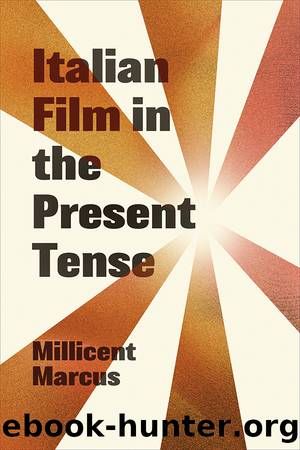Italian Film in the Present Tense by Millicent Marcus;

Author:Millicent Marcus;
Language: eng
Format: epub
Tags: Motion pictures – Italy – History – 21st century
Publisher: University of Toronto Press
This group has gathered to be photographed as members of Andreottiâs government upon his election to a seventh term as prime minister.
The filmâs Giulio is not always motionless, however â with the curved shoulders of the hunchback but the straight lower spine of the martinet, he walks robotically forward or backward with hardly a sideways glance. These movements are structured within the choreography of another dance, one that plays a strategic part in the corporeal dimension of Sorrentinoâs satire: the tightly constrained steps of Giulioâs early morning constitutional down Via del Corso, surrounded by a police escort whose gait is closely matched with the prime ministerâs own. Not to be overlooked is the musical score to which this dance is performed â the hymn-like melody of Fauréâs Pavane pour Orchestra Op. 50, accompanied by a chorus of celestial sweetness that elevates this ritual to the level of a religious procession, as if Giulio were the icon to be paraded through the streets on his saintâs day.7
The quietness of this scene, along with all of those set in Giulioâs household, is played off against the frenzied busyness and kinetic energy that his presence seems to trigger in others. Activity swirls around him â he is the calm within the vortex of public affairs that stretch from 1992 to 1996, and it is in this ironic counterpoint that Sorrentino confronts the enigma at the core of his protagonistâs career: to what can we attribute this unprepossessing characterâs inordinate power and influence over the political life of his country?
Sorrentinoâs film, I would argue, is nothing more than an enactment of that question at the level of form. Il Divoâs cinematic ingenuity â its ability to commandeer such a plenitude of signs at the service of Andreottian representation â works as an analogy to the power mechanisms put in place by the storyâs own protagonist. The filmâs stylistic virtuosity â its flamboyant camerawork, performative excess, over-the-top musical score, obtrusive editing, theatrical lighting, dazzling set design â call such attention to Il Divoâs formal surface that its object of representation ceases to be Andreotti himself, and becomes instead the imaginative processes set in motion by the very idea of representing Andreotti on screen. Itâs as if Sorrentino were saying, âWatch me think cinematically about Andreotti, look what the medium-specific language of film allows me to say about him,â and conversely, âLook at how Andreotti pushes me to expand my own powers of cinematic inventiveness.â
Sorrentinoâs struggle to forge an adequate representational approach to Andreotti parallels the attempts of the characters within the film to overcome the protagonistâs steely reserve. âI have to tell you that I will never understand you. I donât know you,â sighs Vincenzo Scotti, the minister of the interior whose report on Salvo Limaâs murder is met by Giulioâs bizarre riff on his cousin Teresaâs hypochondria. Franco Evangelisti, Giulioâs devoted right-hand man, offers his boss a gift only to be greeted with an ingratitude verging on cruelty. Livia, Giulioâs strong and sympathetic wife,
Download
This site does not store any files on its server. We only index and link to content provided by other sites. Please contact the content providers to delete copyright contents if any and email us, we'll remove relevant links or contents immediately.
Cecilia; Or, Memoirs of an Heiress — Volume 1 by Fanny Burney(32022)
Cecilia; Or, Memoirs of an Heiress — Volume 3 by Fanny Burney(31436)
Cecilia; Or, Memoirs of an Heiress — Volume 2 by Fanny Burney(31380)
The Great Music City by Andrea Baker(30641)
We're Going to Need More Wine by Gabrielle Union(18606)
All the Missing Girls by Megan Miranda(14598)
Pimp by Iceberg Slim(13717)
Bombshells: Glamour Girls of a Lifetime by Sullivan Steve(13665)
Fifty Shades Freed by E L James(12886)
Talking to Strangers by Malcolm Gladwell(12814)
Norse Mythology by Gaiman Neil(12786)
For the Love of Europe by Rick Steves(11331)
Crazy Rich Asians by Kevin Kwan(8861)
Mindhunter: Inside the FBI's Elite Serial Crime Unit by John E. Douglas & Mark Olshaker(8665)
The Lost Art of Listening by Michael P. Nichols(7125)
Enlightenment Now: The Case for Reason, Science, Humanism, and Progress by Steven Pinker(6852)
The Four Agreements by Don Miguel Ruiz(6284)
Bad Blood by John Carreyrou(6255)
Weapons of Math Destruction by Cathy O'Neil(5801)
